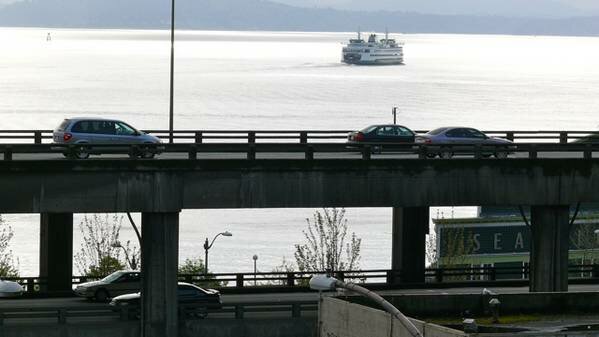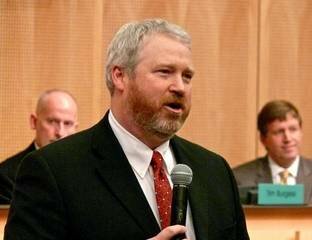A few days ago, the Seattlepi.com's Joel Connelly was scolding Mayor McGinn for his "gratuitous personal insult directed at Gov. Chris Gregoire." At a press conference, McGinn said, "I don't believe we can trust the governor" to protect Seattle against cost overruns from the deep-bore tunnel project. The governor's spokesman Cory Curtis said that Gregoire simply doesn't believe overruns are a threat to Seattle.
That would be news to anyone who's spoken with the state legislature. The latest lawmaker to go on record vowing to make Seattle pay for any excess costs is Rep. Larry Seaquist, a Democrat from Gig Harbor. Seaquist told the Seattlepi.com, "I will be among those who make damn sure that deal stands in place. We bought our own bridge, you can buy your own tunnel" (a reference to funding of the second Tacoma Narrows Bridge).
Gov. Gregoire has mounted lawyerly arguments against the possibility of cost overruns, saying things that sound like there's little possibility of such a thing ever happening, and heaping scorn on McGinn as a foot-dragger. "What could cause a cost overrun? Delay," said the governor, despite the fact that, when it suits WSDOT, a year's extension to the project's timeline is spun as bringing costs down.
Gregoire has also called the specific provision "unenforceable," which may be technically true. But it's also disingenuous. The Legislature is perfectly capable of writing an enforceable provision, and Sen. Jim Kastama (another Democrat) went on record over a year ago to say, if costs exceed the budgeted amount, Seattle will pay. Note that these are both Democrats, and that recent Republican wins have cut into the Democratic majority in both House and Senate....
In the end, four of Council member Mike O'Brien's five amendments to the deep-bore tunnel resolution ended up little grave markers for political transparency. The Port can non-bindingly say it's in for $300 million. The state can stand firmly behind an unfunded transit component. It's late in the game, and it would have been profoundly surprising to find anyone with a change of heart, let alone two or three votes.
"Full speed ahead," trumpets Tim Burgess on his blog, and if you view boldface, assertion, and boldface assertion as successful rhetorical techniques, you can't help but be persuaded. (Winningly, he adds, "The issue of cost overruns has also been resolved.")
The sturm und drang over the prospect of delay on the Alaskan Way Viaduct Replacement project--the bad delay, not the good delay--aside, no one really cares what the Council thinks. It's more the principle of giving the appearance of looking after Seattle's interests. Learning that two-thirds of Seattle residents really do care how much the tunnel may finally cost, the Council went back to the drawing board to look into the benefits of punting....
"basking away" courtesy of our Flickr pool's :MPG:
It's funny, at one time, the conventional wisdom was the deep-bore tunnel funding bill wouldn't have passed without that "You can barely even see it" cost overrun provision, and people took pride in their sausage-making. Now, on the heels of a poll that showed Seattleites do worry about deep-bore tunnel cost overruns, the City Council and Governor Gregoire made sharp about-faces this week, with the Council adding some heretofore "unnecessary" protective language to its end of the agreement, and Gregoire saying the original cost overrun provision didn't come from her office.
Also, the Seattle Times endorsed I-1053, the initiative requiring a super-majority (or a state-wide vote) on any tax increases. (Ironically, simple majority passage of the initiative is good enough for I-1053 backer Tim Eyman--you'd think he'd insist on a two-thirds majority, out of principle.) In this the Times is partners with BP, who still have enough money left over from working on cleaning up the Gulf to fund initiative campaigns.
BREAKING: Popular sentiment is rising to trade the Seattle Times editorial board for the Sacramento Kings.
On our Capitol Hill, crews were trying out a new kind of sidewalk repair. CD News traced the impact of segregation on Seattle neighborhoods. Eastlake Ave. blog noted, ruefully, that repairs are ongoing for the I-5 Ship Canal bridge. Queen Anne View reported that the TV tower climber has been told to STOP DOING THAT....
Mayor McGinn has handed off a Memorandum of Agreement (between Seattle and the state on the $4.2-billion Alaskan Way Viaduct and Seawall Replacement project) to the City Council. It's probably most remarkable for the fact that neither the Council nor the state seem inclined to read, let alone agree, with its "third way" option. Wrote McGinn in a letter to the Council:
Today I am sending the negotiated agreements between the City and the State, together with some new language for your consideration. This language, which we have included as paragraph 2.11 of the master SDOT agreement, proposes what I call the "third way," and it provides us with a path forward to complete the agreement.
In short, this new contract language would stipulate that Seattle’s agreement to go forward will not take effect unless and until the State amends state law to clarify that the State is responsible for all project funding including cost overruns.
This seems a pro forma move by McGinn. The Council has signaled--mightily--that it has absolutely no problem with the cost overrun provision, and has the numbers to override McGinn's paragraph 2.11. Publicola reports that McGinn didn't bother to discuss his revision with the Council before sending it over.
Council President Richard Conlin, shown laughing and talking with a lobbyist for developers like Vulcan (at an event at Vulcan's Discovery Center), told the Seattle Times an interview over the weekend: "If cost overruns take place, then we'll have to figure it out."
Coverage of the tunnel project oversight meeting, attended by Governor Gregoire, the Mayor, and the City Council, provides some real whoppers. As expected, the debate grew out of the legislature's provision that Seattle property owners pay for the deep-bore tunnel project's costs if they exceed the budgeted amount of $3.1 billion.
Governor Gregoire has to take top honors for her cherry-picking defense of public project spending. The Seattle Times quotes her as saying:
"Mr. Mayor, we have a track record that's loud and clear. We have a track record of getting every project done on time and on budget," Gregoire said, specifically referring to the Tacoma Narrows Bridge and the recently finished highway ramps in Sodo.
That's right, "every project" means two projects. When the Mayor listed overruns on the Third Avenue bus tunnel, the Brightwater sewage tunnel and the Beacon Hill light-rail tunnel, the Times says Gregoire retorted, "I didn't manage those projects." She also insisted that "delay" is what causes cost overruns, a week after WSDOT announced that building an extra year into deep-bore tunnel project would actually help keep costs down.
Council member Tom Rasmussen also locked horns with the Mayor over the cost overrun provision, arguing that cost overruns are unlikely to occur because the state, planning for cost overruns, built $415 million extra into the project. Now all the cost overruns have to do is conform to projections....
"So McGinn, Holmes, and McKenna have all passed the bar...," was going to be my lead-in, but I couldn't think of a punchline. Who will rid us of this troublesome cost overrun provision?
Mayor McGinn has a new post on his blog, where he makes a lawyerly argument against hoping for the best in deep-bore tunnel (DBT) construction and crossing overrun bridges only when we come to them. First, he lays out the wider context for cost overruns.
Both City Attorney Pete Holmes and State Attorney General Rob McKenna agree that the state's not-one-dollar-more-than-$2.4-billion limitation on DBT spending is for real and enforceable. McKenna adds that, in any event, the state's control of the transportation budget gives the Legislature what Jerry and George know as "hand."
(McGinn doesn't dwell on this point, but I think it's worth emphasizing: Without that cap, and without a clear signal that Seattle must pay for cost overruns, there would be no legislative agreement to fund the DBT project. It would not have passed. Seattle tunnel boosters, in essence, want to play legislative chicken, and confront the Legislature with a fait almost accompli in the case of overruns, daring the Legislature to pull the plug on a project it's sunk $2.4 billion into.)
On the legal standing of the provision that puts Seattle residents on the hook for cost overruns, Holmes and McKenna differ:
Holmes: "It is not enforceable... We are solid on that, we are very clear on that. It is a red herring."
McKenna: "Once it’s adopted, it’s our job to defend it. A law which is adopted by the Legislature is presumptively constitutional."...
(more)
I just got this news release from the Mayor's office, which has got me imagining the Mayor--frustrated in his attempt to debate City Council president Richard Conlin (vacationing in Greece, loving it)--roving Seattle, buttonholing passersby, and demanding answers.
Don't get me wrong, they're good questions. But it makes for a strange news release, in that there's no actual news involved, except for perhaps, "Mayor Has Questions!"
And here they are:
- Why did the state cap its contribution to the tunnel at $2.4 billion and make Seattle taxpayers responsible to pay for cost overruns?
- How can the City Council protect Seattle taxpayers from paying for cost overruns on the project?
- How can the city manage a state project to prevent cost overruns?
- Given the cap in state law, how would the state legally pay more than $2.4 billion for the project?
- Why has the state shifted risk on the performance bonds away from itself and the contractor and onto Seattle?
- What is the cause of cost overruns on other megaprojects? Is it as proponents claim due to delay? Are there other causes?
- What is the state doing differently here than on other megaprojects to prevent overruns?
- What will happen if the tunneling machine gets stuck underground? Who will pay? How will it be resolved?
- If Seattle has to pay for cost overruns, how would the city pay for them? What taxes would the City Council raise, or what programs would it cut?
"On Monday," Tim Burgess reminds you, "the Council will reconsider and vote on Council Bill 116807, the aggressive solicitation measure the Council adopted 5-4 on April 19, 2010. Mayor McGinn vetoed this legislation on April 26, 2010, and returned it to the Council."
The odds are not good. By Burgess's reckoning, in the past 20 years there have been eight mayoral vetoes and only two have been overridden by the City Council, thus far. Personally, if Burgess's revamped bill stands legal scrutiny, I don't think a trial period is out of line, though the Council majority seems to have jumped at the chance to grandstand in favor of keeping a more punitive law on the books.
But this raises the question: What's such a big deal that the Council will override a mayoral veto?
One, increasing staff hourly wages and the salary of the Executive Director of the City Employees Retirement System. Two, self-cleaning public toilets. "Since the 1980s, Seattle business owners have said the lack of public restrooms was the top issue facing downtown," noted the P-I. (Now the top issue is public safety--public restrooms aren't mentioned at all in the Downtown Seattle Association's list of goals and priorities, despite no progress being made on that once all-important front.)
The Council (Jan Drago and Nick Licata leading the charge) would not take Paul Schell's veto for an answer, and in August 2001 directed "Seattle Public Utilities to enter into a contract for the lease, installation and maintenance of five automatic public restrooms."...
(h/t Publicola) City Council President Richard Conlin needs to work harder on believing impossible things. The Queen in Alice and Wonderland can do six before breakfast, and he gets stuck on just one: believing the state would really make Seattle pay for deep-bore tunnel cost overruns.
In his post "Time to tell the truth about costs and the viaduct tunnel project," he says the risk of cost overruns is an "exaggeration and serves solely to instill fear and doubt" and calls upon Mayor McGinn to "publicly announce that he will do everything in his power to keep the project moving." Since the legislative intent was to shift all responsibility for cost overruns to "Seattle property owners" (with no upper limit), I'm not sure how Conlin is defining "risk" and "exaggeration."
McGinn's made a public announcement, but it's not quite what Conlin was hoping: "I think it is time that Richard and I air these issues and talk them through in a public forum. A debate like this between us will give the public a chance to decide for themselves whether or not we should worry about cost overruns."
Conlin spends a whole paragraph on what he characterizes as the unenforceable state legislature provision that targets Seattle property owners who benefit from the tunnel:
First, the legislation limiting the state’s responsibility says nothing about the City, but instead makes a legally meaningless reference to property owners. In addition to being vague, the statement that names ‘Seattle area property owners’ as responsible for cost overruns has no legal teeth to compel the City to assume cost overruns for a project that the state is managing.
But in the paragraph immediately succeeding that one, he writes: "Yes, the state could take future legislative action to force the city to pay for overruns," appending to that admission the disclaimer, "but this scenario would set a terrible precedent for all Washington cities and an honest political assessment suggests that such a move would never be approved." Just for the record, the first part is a fact. The second part is an assumption....
When Mayor McGinn reaffirmed his intention to veto any city agreement with the state that left Seattle on the hook for cost overruns for the deep-bore tunnel, the City Council, which voted unanimously last year to leave Seattle exposed to unlimited cost overruns, was apoplectic.
"Grandstanding," said Richard Conlin, whose green credentials apparently extend only to composting. (He's worried about delaying the new, higher-car-capacity 520 bridge, too.)
The Seattle Times quotes the council's transportation chair Tom Rasmussen saying direly, "I think it's a dangerous game. I think it's harmful. It's disingenuous." It seems the council, facing a budget deficit, thinks that it's better to hire "lawyers and other experts to make sure the city is protected in that contract from cost overruns," rather than simply demand the Legislature remove the provision.
While widely reported as new news, McGinn has repeated his refusal to accept cost overruns and sketchy financing early and often since he ran for mayor. How the deep-bore tunnel would be funded was his concern back in July '09, when the city had agreed it "would levy a parking tax, increase utility fees, and use any federal grant or economic stimulus money earmarked for transportation on the project," to raise its share totaling $930 million.
In August of '09, McGinn's campaign site was arguing about the cost overrun provision specifically, and noting that "the Seattle share of tunnel costs nearly equals the total of every other voter-approved levy in the city." In October came the city council's inexplicable, unanimous agreement with the state approving Seattle's responsibility for cost overruns. Only Nick Licata seemed to realize what a horrendous decision this was, but the City Attorney assured him the agreement was "more like guidelines."...





Most Recent Comments